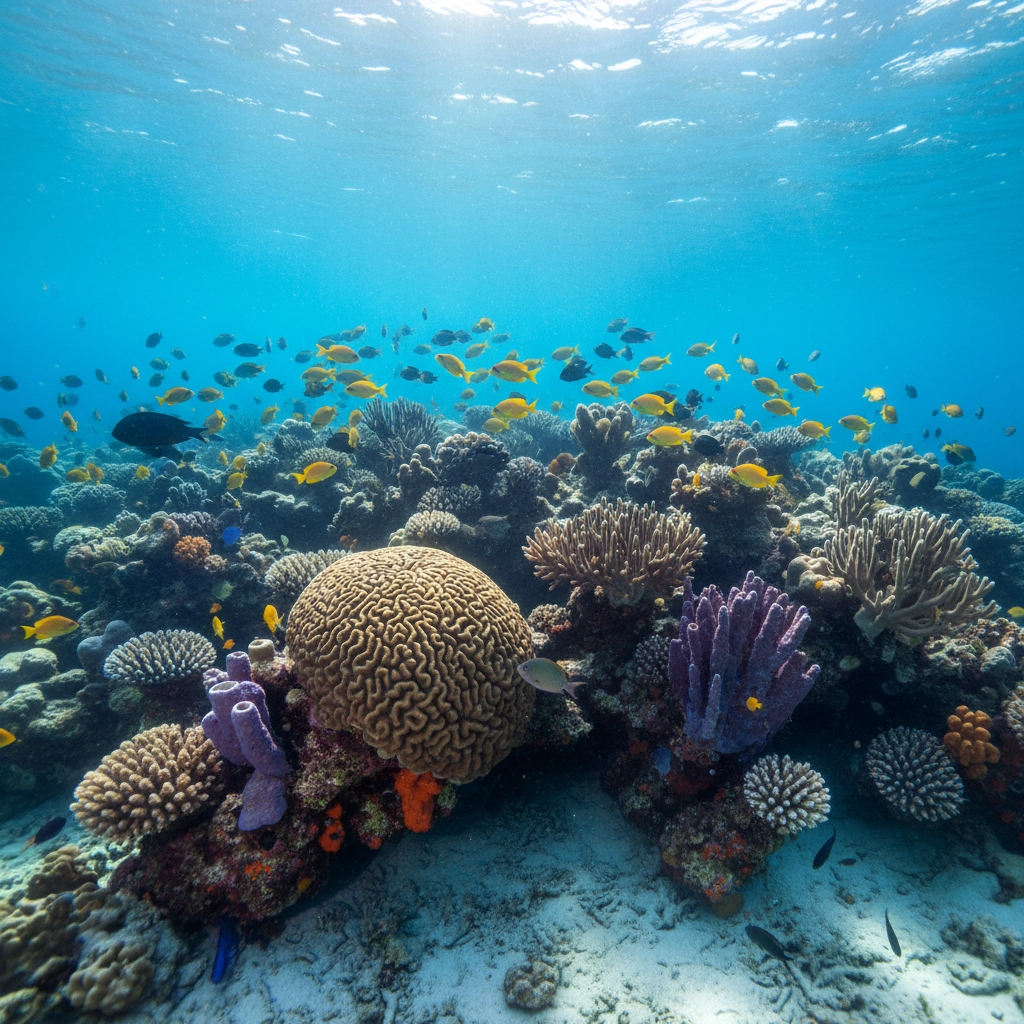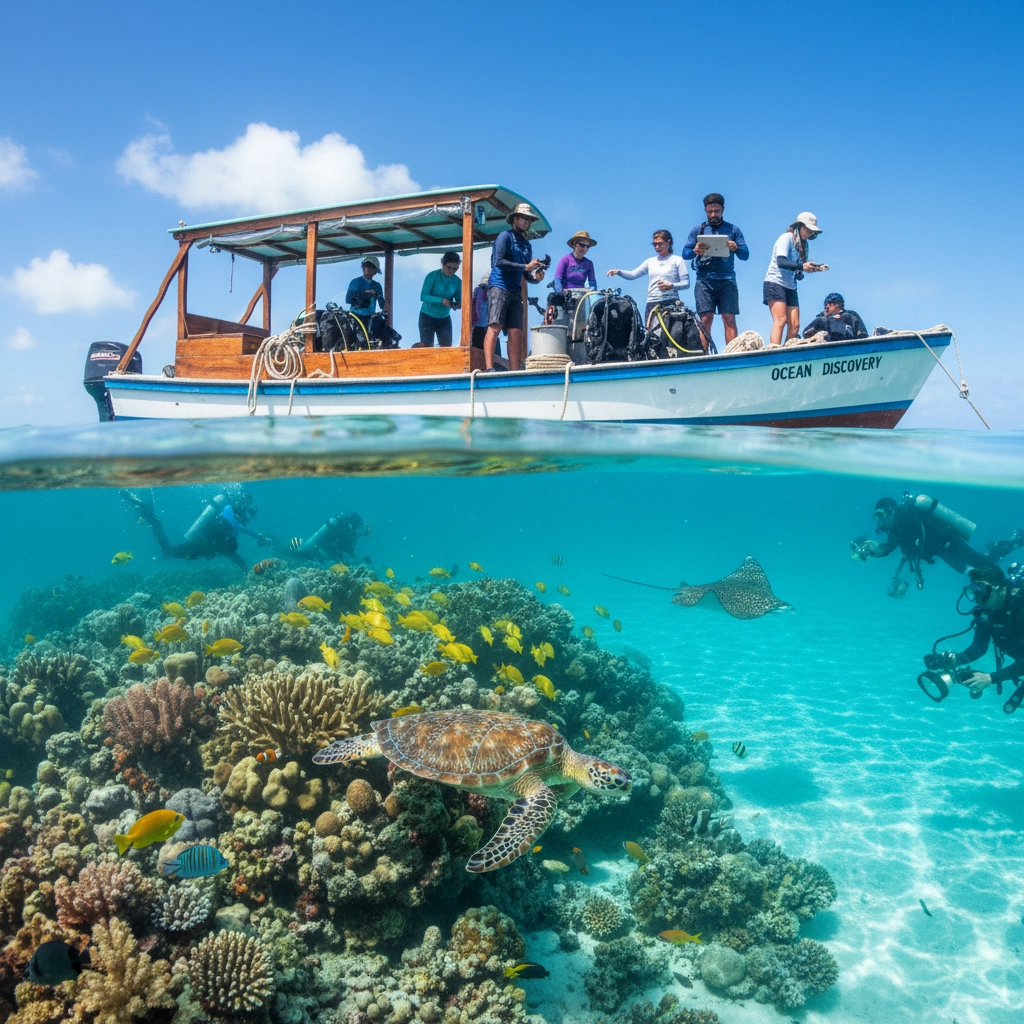Belize's Ocean Ecosystems: Experiential Science Education for Students
- Caleb Mullenix
- Nov 11, 2025
- 5 min read
Preparing students for careers in marine science requires more than textbook learning: it demands direct engagement with living ecosystems where theoretical concepts come alive through hands-on research and conservation work. Belize's pristine marine environments offer educators an unparalleled opportunity to transform their students' understanding of ocean science through immersive fieldwork along the world's second-largest barrier reef system.
The Mesoamerican Barrier Reef: A Living Laboratory
The Mesoamerican Barrier Reef extends over 600 miles along Belize's coastline, creating the most significant coral reef system in the Western Hemisphere. This UNESCO World Heritage site encompasses three distinct atolls, hundreds of cayes, and extensive reef formations that support extraordinary biodiversity essential for comprehensive marine science education.
Ensure your students understand the reef's ecological significance before departure. The system hosts over 500 fish species, 65 coral species, and countless invertebrate populations alongside sea turtles, rays, manatees, and whale sharks. This biodiversity concentration allows students to observe complex ecological relationships within a single expedition, maximizing learning opportunities while minimizing travel logistics.

The reef's integration with adjacent mangrove and terrestrial systems creates unique educational advantages. Coastal mangrove forests serve as critical nursery habitats for juvenile reef fish, while these systems connect ecologically to inland rainforests through watersheds that deliver nutrients to offshore environments. This ecosystem connectivity enables students to study complete environmental cycles and understand how human activities on land directly impact marine health.
Hands-On Research Methodologies Students Master
Coral Reef Health Assessment
Begin by teaching students standardized monitoring techniques used by marine biologists worldwide. Students learn to identify major coral species including brain coral, staghorn coral, and plate corals while establishing permanent monitoring transects using GPS coordinates and underwater markers.
Emphasize the importance of accurate data collection as students assess coral coverage percentages, identify bleaching events, and document disease symptoms using established scientific protocols. This methodology mirrors professional research practices and contributes directly to ongoing reef monitoring databases maintained by Belizean marine protected areas.
Prepare students to understand that their data collection efforts support real conservation initiatives. The coral health assessments they conduct provide critical information for marine park managers making decisions about reef protection strategies and resource allocation.
Marine Biodiversity Surveys
Instruct students in point-count survey techniques, where they identify fish species within specified time intervals while estimating population sizes from designated underwater observation points. Focus training on recognition of indicator species including parrotfish, grouper, snapper, and angelfish populations that reflect reef ecosystem health.
Advanced students should implement transect surveys, swimming predetermined routes while documenting fish communities across measured distances. Ensure proper safety protocols are established before any underwater research activities, including buddy system requirements and emergency response procedures.

Students collect and examine marine invertebrates including sponges, sea fans, sea urchins, and crustaceans, learning identification techniques and ecological functions through direct observation. Emphasize symbiotic relationships such as cleaner shrimp stations and anemone-crab partnerships to develop understanding of complex ecological interactions.
Water Quality Analysis and Environmental Monitoring
Train students to measure critical environmental parameters including temperature, salinity, pH levels, dissolved oxygen, and turbidity using professional field equipment. Students learn to interpret data in relation to coral health and marine organism survival requirements, comparing readings between different reef zones.
Encourage students to maintain detailed monitoring logs and identify trends indicating ecosystem changes over time. Connect these measurements to environmental stressors including coastal development, climate change impacts, and pollution sources to help students understand the practical applications of their research.
Conservation-Focused Learning Experiences
Create opportunities for students to engage in meaningful conservation work rather than passive observation. Service-learning components allow students to work directly with local conservation organizations and community groups on marine protection initiatives, providing authentic context for their scientific learning.
Students explore the history of human interaction with Belize's marine ecosystems, from ancient Mayan fishing practices to contemporary tourism and sustainable resource management challenges. This historical perspective helps students understand conservation within broader cultural and economic contexts.
Address current threats to marine ecosystem health systematically, including climate change impacts on coral bleaching, overfishing pressures, coastal development consequences, and pollution effects. Enable students to propose and evaluate solutions within actual conservation frameworks used by marine protected area managers.

Research Infrastructure and Educational Support
Belize's established marine research facilities provide essential infrastructure for successful educational expeditions. Students are housed at dedicated research centers such as the Belize Marine Tropical Research and Education Center or remote island stations that offer research libraries, laboratories, classrooms, and boat fleets staffed by experienced marine biologists and certified guides.
Ensure your program includes access to professional-grade equipment and scientific resources. Many facilities provide microscopes, water testing equipment, fish identification guides, and underwater research tools that allow students to conduct meaningful scientific investigations.
Plan for programs ranging from intensive 10-day courses to extended multi-week expeditions, depending on your educational objectives and student preparation levels. Typical schedules allocate several hours daily to snorkeling and field exploration, with evening sessions dedicated to data analysis, discussions, and exploration of related conservation topics.
Academic Integration and Assessment Opportunities
Structure your Belize expedition to align with existing curriculum standards in marine biology, environmental science, and earth science courses. Students apply classroom concepts including ecosystem dynamics, species interactions, water chemistry, and conservation biology through direct field research.
Create assessment opportunities that extend beyond traditional testing. Students develop competency in scientific research methodologies, data collection protocols, species identification, and ecological monitoring techniques that demonstrate mastery through practical application rather than memorization.
Encourage students to maintain detailed field journals documenting their observations, research findings, and reflections on conservation challenges. These journals serve as authentic assessment tools while helping students process their learning experiences and develop scientific writing skills.

Safety Protocols and Risk Management
Emphasize the paramount importance of safety planning for all marine research activities. Establish clear protocols for snorkeling and diving activities, including buddy system requirements, emergency communication procedures, and medical response plans.
Ensure all participating students demonstrate basic swimming competency and complete safety orientation sessions before engaging in water-based activities. Maintain constant supervision ratios appropriate for marine environments and weather conditions.
Discuss emergency procedures with students, including protocols for marine life encounters, equipment malfunctions, weather emergencies, and medical situations. Share detailed emergency contact information and evacuation procedures with all participants and their families.
Maximizing Educational Impact Through Preparation
Advise students to complete preparatory coursework covering basic marine ecology, coral reef biology, and Belizean geography before departure. This preparation maximizes learning opportunities during limited field time and enables students to engage more meaningfully with complex ecological concepts.
Encourage students to research current conservation challenges facing Belize's marine ecosystems, including climate change impacts, tourism pressures, and sustainable development initiatives. This background knowledge allows students to understand their research within broader conservation contexts.
Create pre-expedition assignments that familiarize students with marine species identification, research methodologies, and conservation terminology they will encounter during fieldwork. Well-prepared students contribute more effectively to group research efforts and derive greater educational benefit from their experiences.
Belize's marine ecosystems offer unparalleled opportunities for experiential science education that transforms theoretical knowledge into practical understanding of conservation challenges and research methodologies. Through carefully structured programs that emphasize hands-on research, safety protocols, and meaningful conservation work, students develop both scientific competencies and environmental stewardship values that extend far beyond their expedition experience.
Appleseed Expeditions specializes in creating transformative marine science experiences that connect students directly with Belize's remarkable coral reef ecosystems while ensuring the highest standards of educational quality and safety management for participating schools and students.



Comments